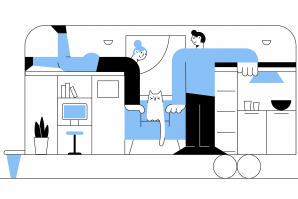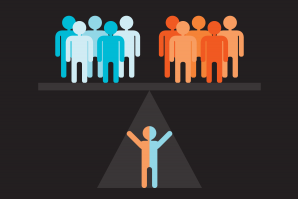As a residual effect of the COVID-19 pandemic, the world experienced an unprecedented shift in workforce practices. As office doors closed and the digital realm beckoned, millions of American workers embarked on an unexpected journey into remote work.
What commenced as a safety measure soon became a massive social experiment, revealing new possibilities for our personal and professional lives. Matthew E. Kahn, a distinguished urban economist, takes us on a compelling exploration of this transformative moment in his book, “Going Remote: How The Flexible Work Economy Can Improve Our Lives and Our Cities.”
As many of us continue to grapple with the uncertainties of today’s changing world, remote work has emerged as a lifeline for countless individuals and businesses. Kahn’s book, “Going Remote,” not only acknowledges this shift but dives deep into the profound changes it’s exacting on our lives and cities.
As Kahn asserts in the book’s introduction:
“We are not going back to the work world of January 2020. Going forward, perhaps as many as 35 percent of the workforce will work from home at least a few days a week. Nobody anticipated this shift in our work arrangements.”
Kahn, a provost professor of economics at the University of Southern California, brings a wealth of knowledge in urban and environmental economics to the table. His research and expertise in climate change economics set the stage for a thought-provoking exploration of how remote work is reshaping our urban landscapes.
In the years leading up to the pandemic, the narrative in urban economics was a tale of two cities. On one hand, we had post-industrial cities like Baltimore and Detroit, struggling to find their economic footing after the decline of manufacturing. On the other hand, superstar cities like Boston, New York City, and Silicon Valley were flourishing, attracting talent and innovation like magnets.
While the latter collection of cities boasted thriving economies, they also faced the challenge of soaring rents and high cost of living. In contrast, post-industrial cities were grappling with poverty and population loss. It was a spatial inequality that seemed difficult to bridge.
Enter the COVID-19 pandemic, which proved to be a disruptive force like no other. The sudden move to remote arrangements created a seismic shift in the way we view work and life. Through this, millions of educated workers discovered that they could maintain productivity and happiness with limited office time.
This newfound flexibility untethered them from a specific location, granting many of us the freedom to choose where they live and how they structure their days.
Kahn’s “Going Remote” introduces us to a new “tale of two cities.” It explores the consequences of persistent remote work on the economic opportunities and quality of life in cities from New York City to Baltimore.
As concerns loom over vacant commercial real estate in cities like Manhattan, the pandemic’s silver lining continues to be revealed. Here, owners of commercial properties have the opportunity to convert these spaces into residential areas. As the trend of remote work continues, rents in major cities may decline, making urban living more accessible to a wider range of people.
This shift has the potential to rejuvenate cities and make them more attractive to a younger, diverse population. Cities that prioritize quality of life — think good schools, safe streets, green spaces and efficient services — will thrive as they become attraction magnets for remote workers seeking an ideal place to live.
But it’s not just superstar cities that stand to benefit. Post-industrial cities like Baltimore and Buffalo could become attractive destinations for remote workers seeking affordability, proximity to nature, and cultural vitality. In a world where work is no longer tied to location, these cities offer unique advantages.
As upper-middle-class remote workers flock to cities like Baltimore, local rents and tax bases will increase, sparking economic growth and diversity. This shift paints a picture of a fairer nation emerging, one where opportunities are not confined to a few select urban centers.
Matthew E. Kahn’s “Going Remote” is more than a book; it’s a roadmap to a new way of working and living. It challenges our preconceived notions about work, passion, and place. In a world where remote work is becoming the norm, Kahn’s insights provide hope and practical solutions for a brighter future.
Recommended For You

Book Review: ‘Artists Remaking Medicine’
Health care professionals and artists learn from each other in a new anthology
Just released in September of 2023, this anthology on the intersection of art and medicine offers a poignant look at the history, practice and future of radical creativity in the industry.

Book Review: ‘Housing for Humans’
An architect advocates for creative, simple solutions to the affordable housing crisis
Washington, D.C., based architect Ileana Schinder is a relentless advocate for residential and urban design solutions that can offer pathways for addressing today’s pernicious affordable housing crisis. She highlights these in her book “Housing for Humans: A Book to Imagine, Create and Design a New Housing Model in America.”

Book Review: ‘The Art of Badassery: Unleash Your Mojo With Wisdom of the Dojo’
A martial artist and health coach helps women apply dojo discipline to personal life and business
Whether the opponent is an overbearing boss, financial hardship or a testy love relationship, Jennifer Cassetta shows readers how to create a roadmap for ascending beyond one’s fears, turning challenges and setbacks into superpowers.

Book Review: The Nature of the Tribe
Tribal Leadership: Leveraging Natural Groups to Build a Thriving Organization
We live in a world of tribes. On a macro level, we discover that every organization is a tribe, a cadre of people involved in formal and informal levels of engagement. The existence of these tribes has major implications for today’s leaders in their quest to create world-class teams, businesses and companies that make a difference.

Book Review: Hard-Hitting Consulting How-To
‘Million Dollar Consulting: The Professional's Guide To Growing A Practice’ is not for the faint of heart
So-called expert consultants abound, but Alan Weiss’ Million Dollar Consulting: A Professional Guide To Building A Practice offers what many other how-tos don’t: modern, actionable tools for building a highly profitable enterprise.



